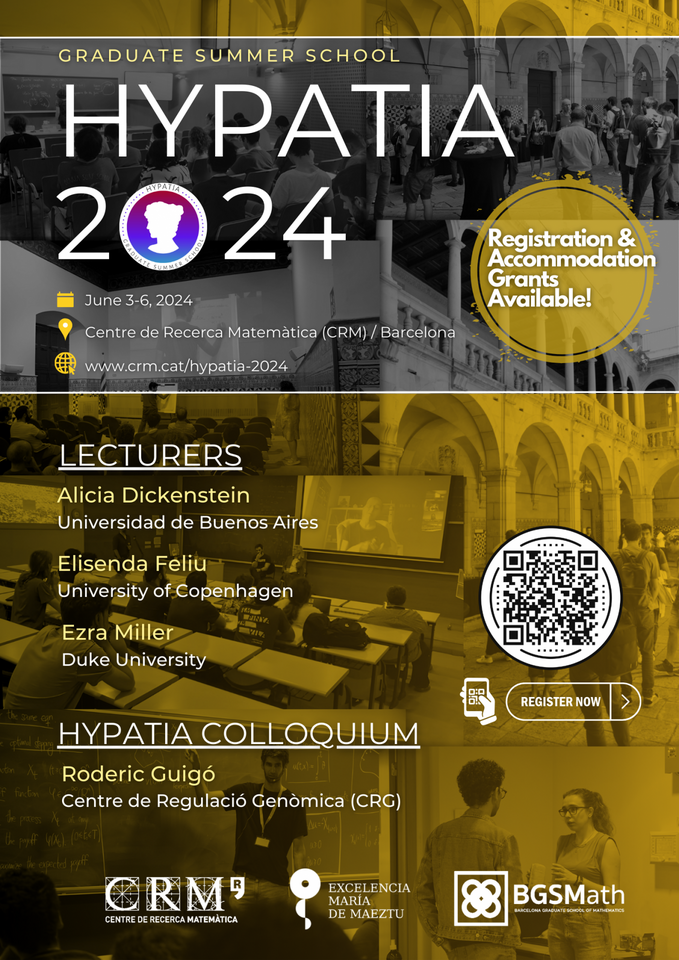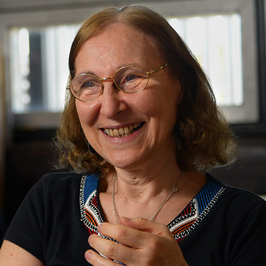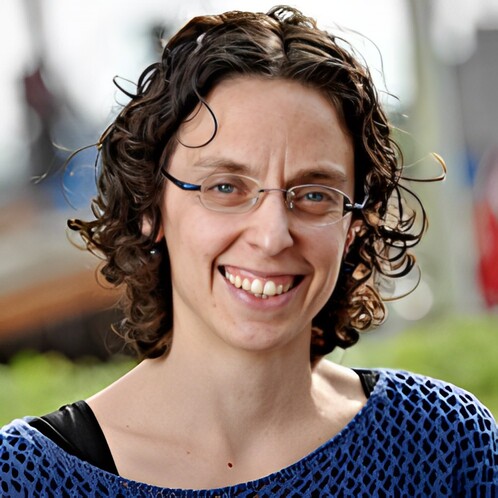Hypatia Graduate Summer School 2024
Sign into June 06, 2024
Registration cost: 275€ (100% onsite)
Included: the attendance to all the activities during the school, coffee breaks, lunches, and catering during the colloquium at IEC
*Attending the colloquium (open for everybody) is free but registration is compulsory by filling out the following:
HYPATIA CHRONICLE & PHOTOS
Declaration of intent

This summer school series aims at training their participants in key strategic problems in mathematics and their applications, with the core idea that theory and applications strengthen each other. The school is focused in training of young researchers whilst opening new fields for senior ones.
The Hypatia Graduate Summer School will consist in two keynote courses on subjects of exceptional promise and scientific importance delivered by highly distinguished speakers in the area plus a high-level colloquium on a complementary subject.
The Hypatia Graduate Summer School will be developed in an informal atmosphere based on discussions, exchange of ideas and critical analysis of results. Moreover, to honour its namesake, it is committed to work under a friendly gender perspective that highlights the role of women in mathematics and encourages and helps the participation and promotion of young female researchers at a professional level.
Previous editions
Hypatia 2023
Hypatia 2022
Lecturers
Website
Alicia Dickenstein
Universidad de Buenos Aires
Alicia is a Full Professor at the University of Buenos Aires and a Senior Researcher at CONICET. She was the Vice-President of the International Mathematical Union during the period 2015-2018. She is a Member of the National Academy of Exact, Physical and Natural Sciences (ANCEFN), a Fellow of the American Mathematical Society, a SIAM fellow and Simons Senior Research Associate of the International Center for Theoretical Physics, Italy. She has received the 2015 TWAS international prize in Mathematics, the ANCEFN Consecration Prize in 2017 and the l’Óreal-Unesco for Women in Science international award in 2021. She has been a visiting professor in institutions in different countries, for example in Sweden at the KTH with funds from the Knut and Alice Wallenberg Foundation, and in France at the Univ. Paris Diderot with an Alicia Moreau chair, and in the US at the MSRI as Eisenbud Professor and as Simons Professor.
Alicia is an expert in Algebraic Geometry who has been interested in applications in mathematical biology. She has made significant contributions to the study of toric varieties, hypergeometric functions, tropical geometry and polynomial systems arising from combinatorics and algebraic geometry. Her research on these topics has led to important advances in some other areas such as chemical reaction networks.
Website
Elisenda Feliu
University of Copenhagen
Elisenda is a Professor at the Department of Mathematical Sciences of the University of Copenhagen, in the research group Mathematics of Reaction Networks. She is a board member of the European Society for Mathematical and Theoretical Biology and a member of the Mathematics panel of the Spanish Research Agency. She is also a member of the Scientific Committee of the Spanish Royal Society of Mathematics (RSME). She is the PI of a prestigious ERC Consolidator Grant (2022-2027) for the project “Signs, polynomials, and reaction networks” and was granted a Sapere Aude Starting Grant from the Independent Research Fund of Denmark (2015-2020).
Elisenda holds a Ph.D. in Mathematics from the Universitat de Barcelona, in the area of Arakelov Geometry/Algebraic K-theory for which she received the Josep Teixidor prize from the Catalan Studies Institute. Later on, she obtained a MSc in Bioinformatics for Health Sciences from the Universitat de Barcelona and the Universitat Pompeu Fabra.
Since then, her research focuses on the application and development of tools in algebraic geometry and algebra to address questions arising in molecular biology. Specifically, she focuses on the mathematical study of interaction networks, mainly on understanding their properties at around equilibrium.
Website
Ezra Miller
Duke University
Ezra is a Full Professor in Mathematics at Duke University but also a Full Professor in Statistical Sciences since 2015 at Duke. He has been the Associate Director of the Statistical and Applied Mathematics Sciences Institute (SAMSI 2011-2014). Before that, he was a Professor at the University of Minnesota and member of the Institute of Mathematics and its Applications. He has also been a Simons CRM Professor at the Centre de Recherches Mathématiques at Montréal. He is a Fellow of the American Mathematical Society, inaugural class, and has been the PI of numerous NSF research grants.
Ezra obtained his Ph.D. at the University of California, Berkeley under the supervision of Bernd Sturmfels. Their book “Combinatorial Commutative Algebra” is now a classic in the area. He also co-authored the book “Twenty-four hours of Local Cohomology and has papers published in top journals such as Annals Math., Duke Math. J, Inventiones Math. or J. Amer. Math. Soc. His research centers around problems in geometry, algebra, topology, combinatorics, statistics, probability, and computation originating in mathematics and the sciences, including biology, chemistry, computer science, and imaging.
COURSES
COURSE 1 | Algebra and Geometry in the study of Biochemical Reaction Networks
Lecturers: Alicia Dickenstein (Universidad de Buenos Aires) and Elisenda Feliu (University of Copenhagen)
Abstract:
Systems of interacting species, as those arising in chemistry, population and molecular biology, and epidemiology, are typically studied with the help of mathematical models. One such approach, employed for biochemical reaction networks, is the use of polynomial differential equations which arise under the law of mass-action kinetics. These polynomials systems involve parameters that are often unknown and may vary across individuals and under changing environmental conditions. The main goal of the theory of reaction networks is to understand the dynamics of these models across the parameter region, and to identify whether special behaviors, such as bistability or oscillations, can arise if the parameter values are selected appropriately. As the systems of interest are polynomial, the field of algebra and algebraic geometry have found a natural application, especially on the study of the equilibria of the systems. More recently, new approaches have emerged by exploiting the interplay between algebra and polyhedral geometry, mainly through the study of the relations between the geometric configuration of the exponents of a polynomial system and the roots of the system.
The course aims at introducing the participants to this exciting field, where algebra, geometry, dynamical systems, and a bit of biochemistry nicely meet. During the course, the basics of the theory of reaction networks will be presented, while we review the required background from computational algebra. Afterwards, we will dig into the fascinating world of multistationarity, which is the term referring to a reaction network admitting two equilibrium points for some parameter values. During the course the students will get an overview of the field while learning to appreciate the beautiful and challenging mathematics that is hidden behind this biological scenario.
COURSE 2 | New perspectives on algebra from applied topology
Lecturers: Ezra Miller (Duke University)
Abstract:
Persistent homology summarizes geometric objects — point sets, images, (graphs of) functions, shapes, and so on — using topology as a recording device. The resulting topological summaries are algebraic gadgets consisting of families of vector spaces indexed by partially ordered sets whose elements are geometric parameters reflecting the “multiscale” nature of the summary. This course introduces algebraic tools to understand what persistent homology is, in a precise mathematical sense. Keeping an eye on applications leads naturally to numerous novel types of questions that are, in the end, purely algebraic.
The course will start with an elementary introduction to persistent homology, including motivating examples. Then, focusing on theory for arbitrary posets and especially multiple integer or real parameters, it will cover
– persistent homology modules,
– finiteness conditions,
– presentation and resolution,
– data structures,
– measures of size and distance between modules, and
– decomposition
while maintaining direct connections to statistical applications of persistent homology in the sciences.
HYPATIA COLLOQUIUM
June 4th, 2024
16:00
Sala Coromines, ground floor – Institut d’Estudis Catalans (IEC)
A computational introduction to life
 Roderic Guigó
Roderic Guigó
Centre de Regulació Genòmica (CRG)
Roderic Guigó obtained his PhD in 1988 for work on Computational Methods on Evolutionary Ecology carried at the Department of Statistics from the Universitat de Barcelona. He did post-doctoral research with Dr. Temple F. Smith at Harvard and Boston Universities, and with Dr. James W. Fickett at Los Alamos National Laboratory in New Mexico (US). In 1994 he returned to Barcelona where he was a researcher at the City Institute for Medical Research (IMIM) and a professor at the University of Barcelona. Currently he is the coordinator of the Bioinformatics and Genomics Program of the Center for Genomic Regulation in Barcelona, and Bioinformatics Professor at the Universitat Pompeu Fabra. Dr Guigo’s main research interests are in the understanding and modeling the regulated production of RNA in eukaryote cells
*If you wish to attend the HYPATIA Colloquium please confirm your attendance by filling out the following form:
ABSTRACT
As methods for automating the recording of natural phenomena and conducting experiments have become increasingly powerful, biology has transitioned into a data-intensive discipline. The field of bioinformatics has emerged, encompassing all branches of biology, to deal with the challenges associated with this transition. In my presentation, I will argue that the success of computational approaches in biology cannot solely be attributed to the vast amounts of data, but also to the unique symbolic nature of biological data at the molecular level. This makes molecular biological data particularly suitable to computational and mathematical approaches.
Website
Schedule
Monday June 3rd | Tuesday June 4th Hosted by the | Wednesday June 5th | Thursday June 6th | |
9:00 9:20 | REGISTRATION | |||
9:20 9:30 | WELCOME | |||
9:30 10:30 | Course 1 Algebra and Geometry in the study of Biochemical Reaction Networks Alicia Dickenstein (Universidad de Buenos Aires) | Course 1 Algebra and Geometry in the study of Biochemical Reaction Networks Alicia Dickenstein (Universidad de Buenos Aires) | Course 1 Algebra and Geometry in the study of Biochemical Reaction Networks Alicia Dickenstein (Universidad de Buenos Aires) | Course 1 Algebra and Geometry in the study of Biochemical Reaction Networks Alicia Dickenstein (Universidad de Buenos Aires) |
10:30 11:00 | COFFEE BREAK | |||
11:00 12:00 | Course 1 Algebra and Geometry in the study of Biochemical Reaction Networks Elisenda Feliu (University of Copenhagen) | Course 1 Algebra and Geometry in the study of Biochemical Reaction Networks Elisenda Feliu (University of Copenhagen) | Course 1 Algebra and Geometry in the study of Biochemical Reaction Networks Elisenda Feliu (University of Copenhagen) | Course 1 Algebra and Geometry in the study of Biochemical Reaction Networks Elisenda Feliu (University of Copenhagen) |
12:00 13:00 | Course 2 New perspectives on algebra from applied topology Ezra Miller (Duke University) | Course 2 New perspectives on algebra from applied topology Ezra Miller (Duke University) | Course 2 New perspectives on algebra from applied topology Ezra Miller (Duke University) | |
13:00 14:30 | FREE TIME | |||
14:30 15:30 | Course 2 New perspectives on algebra from applied topology Ezra Miller (Duke University) | Course 2 New perspectives on algebra from applied topology Ezra Miller (Duke University) | Course 2 New perspectives on algebra from applied topology Ezra Miller (Duke University) | |
15:45 18:15 | Film Projection & Discussion THE IMITATION GAME Morten Tyldum | 16:00-17:00 Colloquium Roderic Guigó (Centre de Regulació Genòmica) _______ 17:00-18:00 Wine and cheese | 15:45 Round Table After the PhD...what?: Finding Your Path After a Mathematics PhD | |
REGISTRATION AND ACCOMMODATION GRANTS
In order to increase the number of young researchers participating in this activity, the CRM offers grants to cover the registration and lodging expenses.
To apply, you must complete the registration process; please go to SIGN IN, choose the General registration option at cost 275€ indicate in the OTHERS section which grant options you wish to apply for; you will be asked to attach your CV. Please click on the Reservation option before finishing the process.
|
Application deadline for grants is 21/04/2024 |
|
Resolutions will be sent by 30/04/2024 |
*Registration covers the attendance to all the activities during the school, coffee breaks, lunches, including the catering at IEC
LIST OF PARTICIPANTS
| Name | Institution |
|---|---|
| Dr. Anand Kumar Yadav | Shishu Niketan Model Sr Sec School, Sector 22D, Chandigarh, India |
| Jules Tsukahara | Sorbonne Université |
| Mehrdad Nasernejad | Artois University |
| Noelia Sánchez | Universitat de Barcelona |
| Antonio Jesús Ortiz García | Universitat Autònoma de Barcelona |
| Joan Ferrer Rodríguez | Universitat Autònoma de Barcelona |
| María de Leyva Elola-Olaso | Universitat Politècnica de Catalunya |
| Xavier Povill | Universitat Politècnica de Catalunya |
| Kamil Przybyszewski | Universitat Politècnica de Catalunya |
| Abel Doñate | Universitat Politècnica de Catalunya |
| Josep Alvarez Montaner | Universitat Politècnica de Catalunya |
| Marta Casanellas Rius | Universitat Politècnica de Catalunya |
| Laura González Hernández | Universitat Politècnica de Catalunya |
| Pau Vives López | Universitat de Les Illes Balears |
| Lucía Castán Anglada | Universidad de Zaragoza |
| Laura Miramón | Universidad de Zaragoza |
| Pablo Serrano | Universidad de Zaragoza |
| Carles Checa | National and Kapodistrian University of Athens |
| Madhusudan Deval | Banaras Hindu University |
| Andrea Rosana | International School for Advanced Studies |
| Soumik Dutta | University of Warsaw |
| Gabriela-Camelia Petcu | University of Bucharest |
| Dino Cerimagic | University of Belgrade |
| Roser Homs Pons | Centre de Recerca Matemàtica |
| Stefano Pedarra | Centre de Recerca Matemàtica |
INVOICE/PAYMENT INFORMATION
IF YOUR INSTITUTION COVERS YOUR REGISTRATION FEE: Please note that, in case your institution is paying for the registration via bank transfer, you will have to indicate your institution details and choose “Transfer” as the payment method at the end of the process.
UPF | UB | UPC | UAB
*If the paying institution is the UPF / UB/ UPC / UAB, after registering, please send an email to comptabilitat@crm.cat with your name and the institution internal reference number that we will need to issue the electronic invoice. Please, send us the Project code covering the registration if needed.
Paying by credit card
IF YOU PAY VIA CREDIT CARD but you need to provide the invoice to your institution to be reimbursed, please note that we will also need you to send an email to comptabilitat@crm.cat providing the internal reference number given by your institution and the code of the Project covering the registration (if necessary).
Lodging information
ON-CAMPUS AND BELLATERRA
BARCELONA AND OFF-CAMPUS
Acknowledgements
scam warning
We are aware of a number of current scams targeting participants at CRM activities concerning registration or accommodation bookings. If you are approached by a third party (eg travellerpoint.org, Conference Committee, Global Travel Experts or Royal Visit) asking for booking or payment details, please ignore them.
Please remember:
i) CRM never uses third parties to do our administration for events: messages will come directly from CRM staff
ii) CRM will never ask participants for credit card or bank details
iii) If you have any doubt about an email you receive please get in touch






 Roderic Guigó
Roderic Guigó

